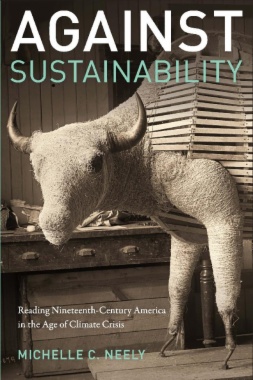Against Sustainability responds to the twenty-first-century environmental crisis by unearthing the nineteenth-century U.S. literary, cultural, and scientific contexts that gave rise to sustainability, recycling, and preservation. Through novel pairings of antebellum and contemporary writers including Walt Whitman and Lucille Clifton, George Catlin and Louise Erdrich, and Herman Melville and A. S. Byatt, the book demonstrates that some of our most vaunted strategies to address ecological crisis in fact perpetuate environmental degradation.
Yet Michelle C. Neely also reveals that the nineteenth century offers useful and generative environmentalisms, if only we know where and how to find them. Henry David Thoreau and Emily Dickinson experimented with models of joyful, anti-consumerist frugality. Hannah Crafts and Harriet Wilson devised forms of radical pet-keeping that model more just ways of living with others. Ultimately, the book explores forms of utopianism that might more reliably guide mainstream environmental culture toward transformative forms of ecological and social justice. Through new readings of familiar texts, Against Sustainability demonstrates how nineteenth-century U.S. literature can help us rethink our environmental paradigms in order to imagine more just and environmentally sound futures.
- Cover�������������������������������
- AGAINST SUSTAINABILITY
- Title�������������������������������
- Copyright�������������������������������������������
- CONTENTS
- Introduction. The Unlikely Environmentalisms of Nineteenth-Century American Literature����������������������������������������������������������������������������������������������������������������������������������������������������������������������������������������������������������������������������������������������������������������������������������
- 1. Recycling Fantasies: Whitman, Clifton, and the Dream of Compost����������������������������������������������������������������������������������������������������������������������������������������������������������������������������������������������������������������������
- 2. Joyful Frugality: Thoreau, Dickinson, and the Pleasures of Not Consuming�������������������������������������������������������������������������������������������������������������������������������������������������������������������������������������������������������������������������������������������������
- 3. The Problem with Preservation: Aesthetics and Sanctuary in Catlin, Parkman, Erdrich, Melville, and Byatt�������������������������������������������������������������������������������������������������������������������������������������������������������������������������������������������������������������������������������������������������������������������������������������������������������������������������������������������������
- 4. Radical Pet Keeping: Crafts, Wilson, and Living with Others in the Anthropocene����������������������������������������������������������������������������������������������������������������������������������������������������������������������������������������������������������������������������������������������������������������������
- Coda. Embracing Green Temporalities: Indigenous Sustainabilities, Anglo-American Utopias����������������������������������������������������������������������������������������������������������������������������������������������������������������������������������������������������������������������������������������������������������������������������������������
- Acknowledgments�������������������������������������������������������������
- Notes�������������������������������
- Bibliography����������������������������������������������������
- Index�������������������������������

